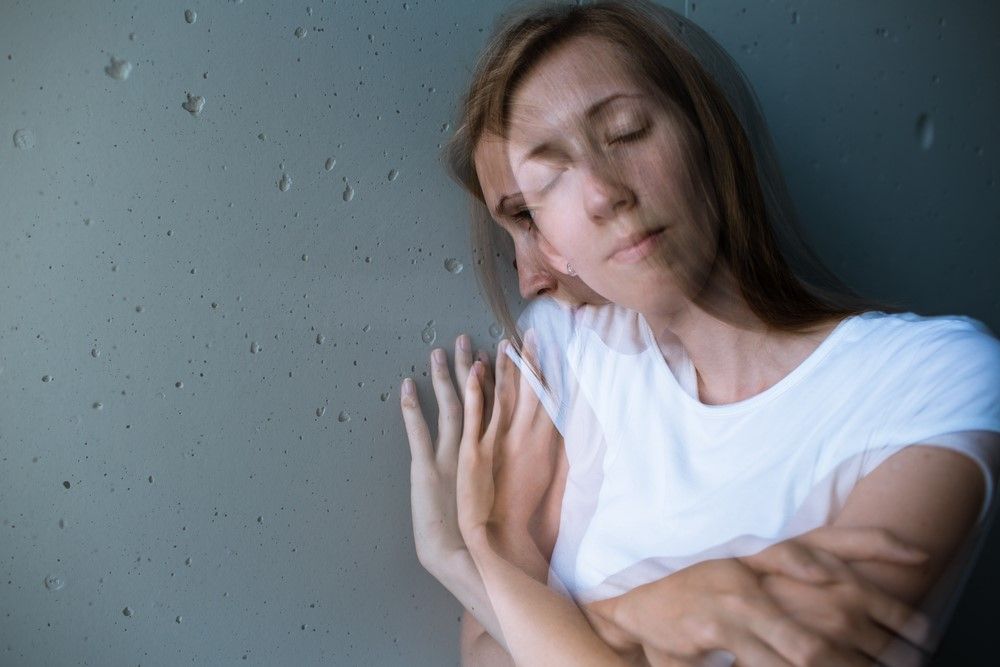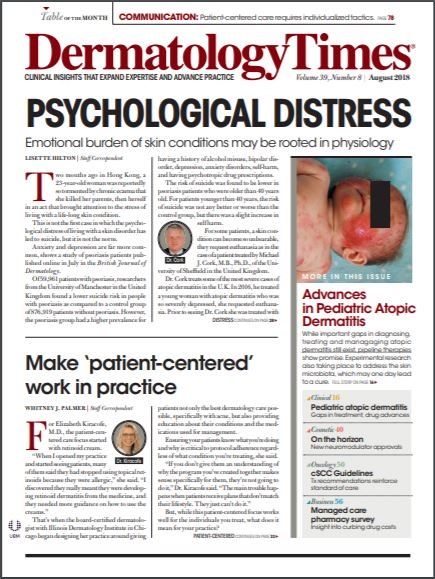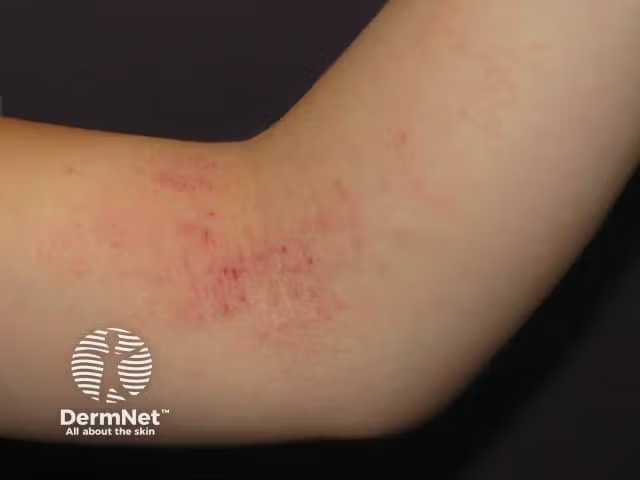- Case-Based Roundtable
- General Dermatology
- Eczema
- Chronic Hand Eczema
- Alopecia
- Aesthetics
- Vitiligo
- COVID-19
- Actinic Keratosis
- Precision Medicine and Biologics
- Rare Disease
- Wound Care
- Rosacea
- Psoriasis
- Psoriatic Arthritis
- Atopic Dermatitis
- Melasma
- NP and PA
- Skin Cancer
- Hidradenitis Suppurativa
- Drug Watch
- Pigmentary Disorders
- Acne
- Pediatric Dermatology
- Practice Management
- Prurigo Nodularis
- Buy-and-Bill
Publication
Article
Dermatology Times
Emotional burden of skin conditions may be rooted in physiology
Author(s):
LightpoetShutterstock.com

Two months ago in Hong Kong, a 23-year-old woman was reportedly so tormented by chronic eczema that she killed her parents, then herself in an act that brought attention to the stress of living with a life-long skin condition.
This is not the first case in which the psychological distress of living with a skin disorder has led to suicide, but it is not the norm.
Anxiety and depression are far more common, shows a study of psoriasis patients published online in July in the British Journal of Dermatology.
Of 59,961 patients with psoriasis, researchers from the University of Manchester in the United Kingdom found a lower suicide risk in people with psoriasis as compared to a control group of 876,919 patients without psoriasis. However, the psoriasis group had a higher prevalence for having a history of alcohol misuse, bipolar disorder, depression, anxiety disorders, self-harm, and having psychotropic drug prescriptions.
The risk of suicide was found to be lower in psoriasis patients who were older than 40 years old. For patients younger than 40 years, the risk of suicide was not any better or worse than the control group, but there was a slight increase in self harm.
For some patients, a skin condition can become so unbearable, they request euthanasia as in the case of a patient treated by Michael J. Cork, M.B., Ph.D., of the University of Sheffield in the United Kingdom.
Dr. Cork treats some of the most severe cases of atopic dermatitis in the U.K. In 2016, he treated a young woman with atopic dermatitis who was so severely depressed, she requested euthanasia. Prior to seeing Dr. Cork she was treated with oral steroids. She attempted to enroll in a dupilumab trial, but wasn’t eligible.
“So I met the CEO of Regeneron and showed him her pictures and how desperately ill she was. He gave her immediate approval for compassionate use. It was four weeks before Christmas when she started dupilumab and by Christmas Eve, she was completely transformed,” Dr. Cork said.
PSYCHOLOGICAL BURDEN OF DISEASE
The psychologic burden of skin disorders has been documented in many studies. A review published in June in the journal Skin Pharmacologyand Physiology, shows that approximately 30% of patients with skin disorders suffer from a psychological condition, such as anxiety and depression.
In one study cited in the review, of 3,207 patients with hidradenitis suppurativa (HS), 42% suffer from depression. Another study of 154 patients with HS reported 35% having depression or 21% having depressive symptoms.
Several studies cited in the review reported high rates of suicidality among patients with atopic dermatitis and HS. But among psoriasis patients, a 2017 systemic review published in the American Journal of Clinical Dermatology found no increased risk of suicide, but that study was deemed to be of low quality.
Adults with atopic dermatitis are 2.24 times more likely to suffer moderate depression and 5.64 times more likely to be severely depressed compared to adults without the disease, shows a clinical research letter published in 2015 in the Journal of Investigative Dermatology.
A 2015 article published in Medicine showed that in children, there is a dose-dependent relationship between atopic dermatitis severity and psychological distress. Adolescents with atopic dermatitis were more likely to suffer suicidal ideation than healthy teens.
HOW UNTREATED SKIN DISEASE CAN AFFECT THE BRAIN
Dr. Cork and colleagues are conducting research that examines the “atopic dermatitis psychiatric march,” which explains how untreated atopic dermatitis can affect the brain, leading to mental health disorders and suicide in severe cases.
“From a biological perspective, we suspect mental health disorders, like depression and anxiety, are related to atopic dermatitis because the inflammation in the skin alters the neurotransmitters in the brain,” Dr. Cork said. “There’s very good data in rheumatoid arthritis that the inflammation affects the brain. We’re basically proposing the same occurs in atopic dermatitis.”
Other researchers have explored this theory in dermatology. Writing in the June 28 online issue of Skin Pharmacology and Physiology, Farzanfar D. et al. wrote, “The potential relationships between cutaneous inflammation and central nervous system contributions form a chronic feedback loop.”
There are a number of underlying shared mechanisms between severe atopic dermatitis and psychiatric disorders, including genetic associations, stress, inflammation, sleep disturbance and environmental factors, according to Shatha Shibib, M.B., Ch.B., a child and adolescent psychiatrist at Sheffield Children’s Hospital NHS Foundation Trust in the United Kingdom. Dr. Shibib has a special interest in psycho-dermatology and is an author on the atopic dermatitis psychiatric march study with Dr. Cork.
The brain and skin share a common embryological origin, the ectoderm, she said.
In our practice we have observed an association between the itch-scratch cycle and a cycle of stress-inflammation and the development of depressive symptoms and negative cognitions. Negative cognitions render an individual more prone to the development of emotional disorders such as anxiety and/or depression and suicide in those severely affected,” Dr. Shibib said.
“Hopelessness and statements such as ‘I wish I wasn’t born’ are common. Of note to dermatologists, negative cognitions can be reinforced by the relapsing and remitting nature of atopic dermatitis. They can also be reinforced by perceived hopelessness from treating clinicians and family members, particularly when a number of treatments have been tried and treatment effects are not as expected,” she said.
Effective treatment and targeting inflammation early can quickly “switch off” depression and, potentially, the psychiatric march, altering the trajectory of those affected, Dr. Cork said.
The International Eczema Council discourages the routine use of systemic corticosteroids, suggesting physicians reserve them for special circumstances, but oral steroid use is a common thread in some stories of suicidality and atopic dermatitis, said Dr. Cork who rarely treats severe atopic dermatitis with oral corticosteroids because the adverse effects may outweigh its benefits.
Treatment risk must be carefully weighed, said Elaine C. Siegfried, M.D., of Cardinal Glennon Children's Hospital, St. Louis.
“My motto is never prescribe a treatment that carries a risk of side effects that outweighs the risks of the disease. Knowing that depression and suicidality are potential risks of severe atopic dermatitis helps put more aggressive treatment into context,” she said.
The tolls severe atopic dermatitis can take on sleep and mental health are among the disease’s most significant comorbidities. They can be life-altering, even life-threatening, she said.
While dupilumab is approved for adults with moderate-to-severe atopic dermatitis in the U.S., the FDA has not yet approved it for pediatric atopic dermatitis. Clinical trials in adolescents are underway, but the early data shows an improvement in atopic dermatitis and emotional well-being, Dr. Cork said.
Ironically, suicidal patients may not be candidates for drug trials because their mental health status may be considered an exclusion criteria. “This needs to be corrected. We need to make sure we can get these drugs to patients with severe atopic dermatitis,” he said.
ENDPOINT: LONG-TERM DISEASE CONTROL
The stories and statistics reflect what many dermatologists already know about severe skin disease, said Lawrence F. Eichenfield, M.D., of Rady Children’s Hospital in San Diego.
“Severe disease has been underappreciated amidst the much higher numbers of patients with milder disease, which is the predominant epidemiology â especially younger children. More severe disease has not been well managed because of limited use of systemic medications,” he said.
With the approval of dupilumab (Dupixent, Regeneron and Sanofi) for adults with atopic dermatitis, and other therapeutic agents in the pipeline that may change, he said.
“Dermatologists and others have to acknowledge bad atopic dermatitis and treat it â with long-term disease control being the endpoint. That’s the message: Long-term disease control with whatever you need therapeutically proportionate to disease severity,” Dr. Eichenfield said.
It’s vital that dermatologists become aware of the mental health impact of atopic dermatitis and adequately address its psychological toll in the clinic setting, Dr. Eichenfield said.
“We need to move from the quick follow-up visits where we’re refilling drugs and really figure out what we need to do to get the disease under control so that it doesn’t impact the life of the child,” he said.
REFERENCES
Parisi R, Webb RT, Kleyn CE, et al. "Psychiatric morbidity and suicidal behaviour in psoriasis: a primary care cohort study," British Journal of Dermatology. Published online July 14, 2018. DOI:10.1111/bjd.17004
Simpson EL, Guttman-Yassky E, Margolis DJ, et al. "Association of Inadequately Controlled Disease and Disease Severity With Patient-Reported Disease Burden in Adults With Atopic Dermatitis,"JAMA Dermatology. July 3, 2018 ePub ahead of print. DOI: 10.1001/jamadermatol.2018.1572
Farzanfar D., Dowlati Y., French L.E., Lowes M.A., Alavi A. "Inflammation: A Contributor to Depressive Comorbidity in Inflammatory Skin Disease," Skin Pharmacology and Physiology. June 28, 2018 online ahead of print. DOI:10.1159/000490002.
Chi CC, Chen TH, Wang SH, Tung TH. “Risk of suicidality in people with psoriasis: a systematic review and meta-analysis of cohort studies,” American Journal of Clinical Dermatology. 2017; 18: 621–627.
Sherry H. Yu, Jonathan I. Silverberg. "Association between Atopic Dermatitis and Depression in US Adults," Journal of Investigative Dermatology. December 2015. DOI:10.1038/jid.2015.337
Si-Heon Kim, MD, Jae Hur, MD, Jae-Yeon Jang, et al. "Psychological Distress in Young Adult Males with Atopic Dermatitis A Cross-Sectional Study," Medicine. June 2015. DOI:10.1097/MD.0000000000000949
A.M. Drucker K. Eyerich M.S. de BruinâWeller, et al. "Use of systemic corticosteroids for atopic dermatitis: International Eczema Council consensus statement,"British Journal of Dermatology. Sept. 2, 2017. DOI:10.1111/bjd.15928







